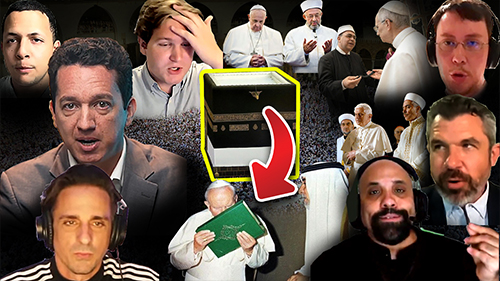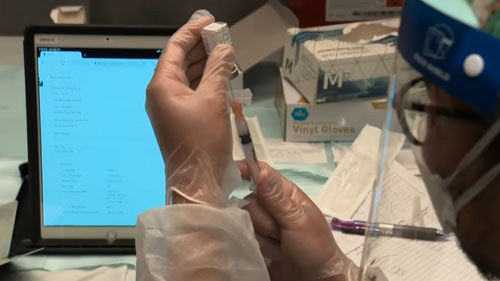| Recent Featured Videos and Articles | Eastern “Orthodoxy” Refuted | How To Avoid Sin | The Antichrist Identified! | What Fake Christians Get Wrong About Ephesians | Why So Many Can't Believe | “Magicians” Prove A Spiritual World Exists | Amazing Evidence For God | News Links |
| Vatican II “Catholic” Church Exposed | Steps To Convert | Outside The Church There Is No Salvation | E-Exchanges | The Holy Rosary | Padre Pio | Traditional Catholic Issues And Groups | Help Save Souls: Donate |  |









 " />
" /> " />
" /> " />
" /> " />
" /> " />
" />




Mystici Corporis
Some have the false impression that the horrific pre-Vatican II heresy, which was catalogued above, was also taught by Pope Pius XII in his encyclical Mystici Corporis. This is not true. The passage that the heretics love to quote from Mystici Corporis is weak, but not heretical. It is accurately translated as follows:
First of all, this passage from Mystici Corporis has been incorrectly translated by many to further weaken and to pervert the actual words of Pius XII. The phrase (ab eo statu se eripere studeant, in quo de sempiterna cuiusque propria salute securi esse non possunt) which is correctly translated as “…extricate themselves from that condition in which they cannot be secure about their own eternal salvation,” has been mistranslated as “look to withdrawing from that state in which they cannot be sure of their salvation.”[2] This mistranslation gives the clear impression that non-Catholics have an outside chance at gaining salvation where they are.
It’s very interesting that even a heretical defender of Protocol 122/49, Msgr. Fenton, admits that “sure” is a seriously misleading translation.
Fenton goes on to point out that the mistranslation gives the impression that Catholics can be sure of their salvation, which is a heresy condemned by the Council of Trent (Trent, Sess. 6, Chap. 9).
The other part of Mystici Corporis that has been incorrectly translated by many to further weaken and to pervert the actual words of Pius XII is the phrase, in Latin: “quandoquidem, etiamsi inscio quodam desiderio ac voto ad mysticum Redemptoris Corpus ordinentur” has been mistranslated by many to read: “For even though unsuspectingly they are related in desire and resolution to the Mystical Body of the Redeemer…” This is a deliberate mistranslation which alters the meaning of Pius XII’s words. I will quote Bro. Robert Mary in Father Feeney and the Truth About Salvation to explain why this is an incorrect translation.
Bro. Robert Mary has astutely pointed out how it is false to say that Pius XII taught that some non-Catholics are “related” to the Church by unknowing desire, and that Pius XII certainly did not teach that some non-Catholics are “united” to the Church. But this is how one finds Mystici Corporis translated in many papers, especially those written by priests who deny the dogma Outside the Church There is No Salvation.
While the important observation above shows how wrong the modern heretics’ treatment of Mystici Corporis is, there is no doubt that Pius XII’s statement in the above passage – even correctly translated – is still pathetically weak, and opens the door for liberal heretics to claim that he endorsed the heresy that non-Catholics can be saved by their unknowing desire for the Catholic faith. Its weakness displays the mindset of a man who allowed heresy against the dogma Outside the Church There is No Salvation to run rampant in the seminaries, theology texts and Catechisms during his reign, even if not explicitly taught by him. Pius XII had no business talking about the supposed unknowing desire and resolution of non-Catholics, even if he didn’t assert that such could be saved. Everyone knows that even the mention of such a thing causes modernists to salivate like dogs over a tasty meal. Pius XII should have addressed non-Catholics in the manner of Pope Leo XII, and he should have reaffirmed that non-Catholics will surely perish if they don’t hold the Catholic faith in the manner of Gregory XVI.
A strong reaffirmation of Catholic teaching such as this by Pius XII would have eliminated all of the heretics’ claims against the dogma by referencing his encyclical. Nevertheless, here are a few other statements from Pope Pius XII which are worthy of note.
These two statements exclude the idea that one can be saved by even an explicit desire for baptism, since they affirm that those who have not received the Sacrament of Baptism are not Christians or members of the Church or members of Christ. (Those who are not Christians or members of the Church or members of Christ cannot be saved.)
Actually, if one admits that the above quote from Mediator Dei is magisterial (and therefore infallible), it alone eliminates any theory of baptism of desire, because it asserts that the differentiation between those who have received the mark of baptism (and are members of Christ) and those who have not received the mark of baptism (and consequently are not members of Christ) is as pronounced as those who have been made priests by ordination and those who have not. In other words, according to the pronouncement of Pope Pius XII in Mediator Dei, to assert that one could be a Christian or a member of Christ without the mark of baptism (which is what the theory of baptism of desire asserts) is akin to asserting that one can be a priest without ordination.
Furthermore, as quoted already, in Humani Generis in 1950 Pope Pius XII actually put his finger directly on the heresy at work against Outside the Church There is No Salvation.
Pope Pius XII is here condemning the exact heresy common to all the modern day heretics who deny this dogma. They reduce the dogma Outside the Church There is No Salvation to a meaningless formula by saying that it doesn’t mean what it says!
It should also be noted that even though Pope Pius XII did not teach that non-Catholics could be united to the Church and saved by a “certain unknowing desire and resolution,” if he had, he would have been teaching heresy – a heresy refuted by his own statements above. As St. Paul tells us, “But though we, or an angel from heaven, preach a gospel to you besides that which we have preached to you, let him be anathema” (Gal. 1:8). The problem with Pope Pius XII, however, was not primarily what he said regarding this dogma, but what he didn’t say, and more specifically, what he allowed by silence, neglect (and perhaps by direct support) to happen to the dogma Outside the Church There is No Salvation and Father Leonard Feeney, S.J. What he allowed to happen was a crime so momentous that it cannot be measured. What he allowed to happen would turn out to be an incalculable scandal to the faithful and an impediment to the salvation of millions of souls in his day, and for a generation to come.
Endnotes:
[1] Translated by Msgr. Joseph Clifford Fenton, The Catholic Church and Salvation, p. 85.
[2] Bro. Robert Mary, Father Feeney and The Truth About Salvation, p. 153.
[3] Msgr. Joseph Clifford Fenton, The Catholic Church and Salvation, p. 88.
[4] Bro. Robert Mary, Father Feeney and The Truth About Salvation, p. 154.
[5] The Papal Encyclicals, Vol. 1 (1740-1878), p. 207.
[6] The Papal Encyclicals, Vol. 1 (1740-1878), p. 238.
[7] Denzinger 2286.
[8] The Papal Encyclicals, Vol. 4 (1939-1958), p. 127.
[9] The Papal Encyclicals, Vol. 4 (1939-1958), p. 179; Denzinger 2319.
Sign up for our free e-mail list to see future vaticancatholic.com videos and articles.
Recent Content
^